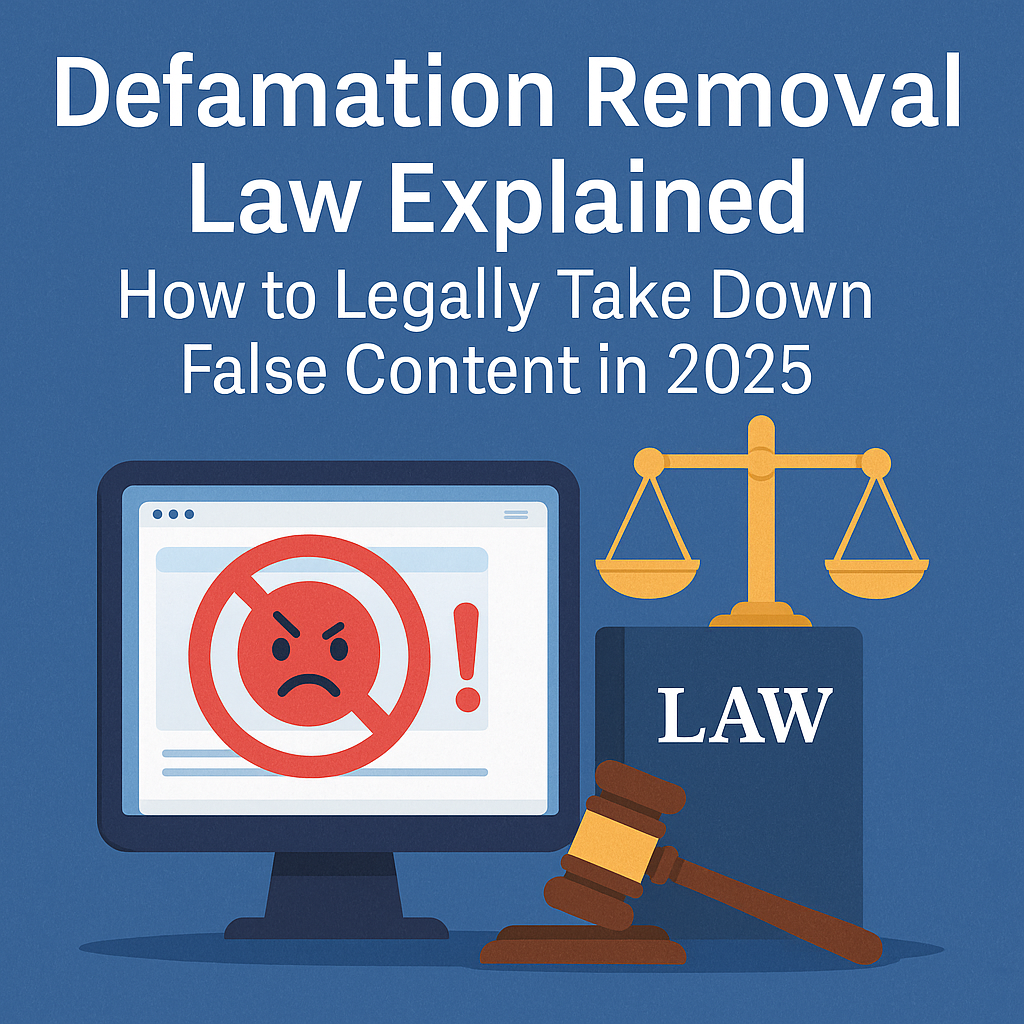Estimated reading time: 5 minutes
False statements posted online can destroy reputations in minutes. Whether on Google, Reddit, Facebook, or complaint sites, defamatory content spreads quickly and is hard to erase—unless you understand how defamation removal law works. If you’re searching for ways to get harmful content taken down legally, this in-depth guide walks you through your rights, remedies, and legal removal strategies under defamation removal law.
Table Of Content
What Is Defamation Under the Law?
Defamation is a false statement presented as a fact that injures a person or organization’s reputation. There are two primary forms:
- Libel – written or published defamation (blog posts, social media, news articles)
- Slander – spoken defamation (videos, interviews, live streams)
To qualify as legally actionable defamation, the statement must:
- Be false
- Be presented as a fact (not opinion)
- Be made to someone other than the target
- Cause reputational, financial, or emotional harm
Legal Standards for Defamation Claims
Each U.S. state has its own defamation statutes, but most follow similar principles. To prove defamation, plaintiffs must demonstrate:
- A false and defamatory statement was made
- The statement was published or broadcast
- The statement was made with negligence or actual malice
- The plaintiff suffered harm as a result
For public figures, proving actual malice—knowledge of falsity or reckless disregard for the truth—is also required.
Refer to Cornell Law School’s defamation doctrine for more context.
Key Defamation Removal Laws to Know in 2025
1. Communications Decency Act (CDA) – Section 230
- Shields websites and platforms from being held liable for user-generated content
- Does not protect users from liability for defamation
- Does not block court-ordered removals
2. State Defamation Statutes
- Each U.S. state has civil laws addressing libel and slander
- Some states have anti-SLAPP laws to prevent misuse of defamation suits to silence speech
See the NCSL defamation law database.
3. Court Order Doctrine
- U.S. and international courts can issue injunctions requiring removal of defamatory content
- Most major platforms honor valid court orders
4. International Privacy & Defamation Laws
- GDPR (Europe): Right to erasure for false/harmful personal data
- UK Defamation Act: Requires proof of serious harm to reputation
- Australia: Allows direct defamation suits against online users and even platforms
Step-by-Step Legal Strategy to Remove Defamatory Content
Step 1: Document the Defamation
- Screenshot the content with timestamps
- Archive the URL via Wayback Machine
- Identify the author (if possible)
- Record examples of damage (lost sales, harassment, distress)
Step 2: Contact the Publisher
- Politely request removal
- Send a cease and desist letter if ignored
- Cite defamation statutes and proof of falsity
This is often effective for small websites or independent blog owners.
Step 3: Report Content to Platforms
Each platform has reporting tools. Choose the closest category:
- Facebook/Instagram: Harassment or false information
- Google: Legal removal under court order
- Yelp/Google Reviews: Violation of review policies
- YouTube: Defamation/harassment via content reporting
Step 4: File a Lawsuit If Necessary
If content remains and damages continue:
- Hire a defamation attorney
- File a civil defamation suit in state or federal court
- Request injunctive relief and damages
Once you win, submit the judgment to search engines and platforms to compel content takedown.
Step 5: Submit Court Orders for De-indexing
Google and other search engines accept valid court orders for:
- Defamatory blog posts
- False reviews
- News articles containing untrue claims
Use the Google Legal Takedown Tool.
Platforms That Require Legal Action for Content Removal
- Google Search and Autocomplete
- Reddit (subreddits often refuse takedowns without court pressure)
- Ripoff Report (refuses removal without legal judgments)
- Third-party news aggregators
Court orders or aggressive legal letters are typically the only path to removal here.
How to Handle Anonymous Defamation
Anonymous posts can be unmasked by:
- Filing a John Doe lawsuit
- Subpoenaing platforms or ISPs for user metadata
- Using forensic investigators for IP tracking
Once the person is identified, standard defamation proceedings apply.
When Defamation Doesn’t Qualify Legally
Content may not be legally defamatory if it is:
- Clearly labeled opinion
- True but damaging
- Fictional or satire
- In a public forum with disclaimer
Courts protect freedom of expression—but they do not protect deliberate lies meant to ruin reputations.
Tactics That Complement Legal Defamation Removal
1. SEO Suppression
- Create positive content to outrank negative listings
- Publish blogs, press releases, and public interviews
- Use schema markup to improve visibility in search
2. Reputation Monitoring
- Google Alerts
- Mention.com or Brand24
- Visualping for real-time tracking
3. Partner With Removal Experts
Defamation Defenders collaborates with attorneys to:
- Draft takedown letters
- Manage platform-specific removals
- Suppress content in search results
- Monitor new threats
📞 Schedule a legal consultation to begin a takedown strategy tailored to your case.
FAQ: Defamation Removal Law
Yes, under civil tort law. It’s not a crime in most U.S. states but can result in lawsuits and injunctions.
If the platform agrees the content violates policy, yes. If not, a court order is usually required.
Submit a valid court order to the hosting platform and search engines. Some removals happen within 10–20 business days.
Yes, but they must prove actual malice, which is a higher legal standard.
Libel is written. Slander is spoken. Both fall under defamation tort law.
Each state has its own statute of limitations—typically 1 to 2 years from when the defamatory statement was published.
Related Contents:
MLA Citations:
-
“Defamation.” Cornell Legal Information Institute, 2025, https://www.law.cornell.edu/wex/defamation.
-
“Legal Removal Requests.” Google Support, 2025, https://support.google.com/legal/troubleshooter/1114905.
-
“State Internet Defamation Laws.” National Conference of State Legislatures, 2025, https://www.ncsl.org.
-
“Communications Decency Act.” Electronic Frontier Foundation, 2025, https://www.eff.org/issues/cda230.
-
“Defamation Act 2013.” UK Parliament, 2025, https://www.legislation.gov.uk/ukpga/2013/26/contents/enacted



